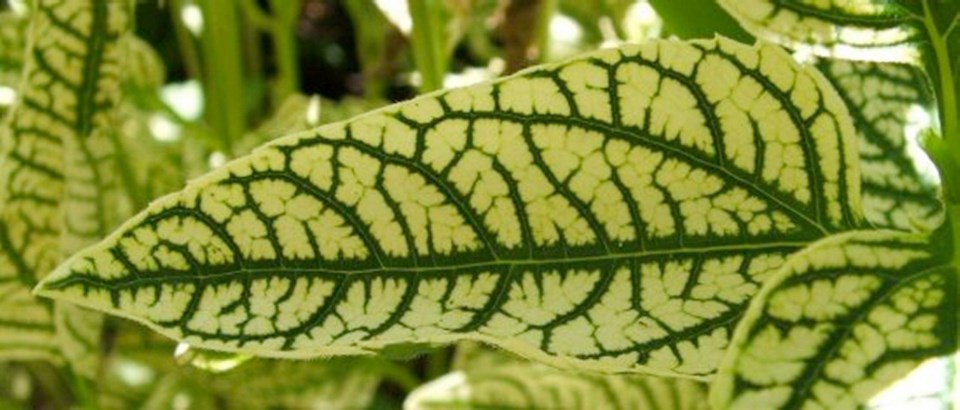Dear Helen: I recently saw a beautiful perennial with vividly variegated leaves. Yellow daisy type flowers were just starting to appear. The plant was around one metre high. The leaves were long, pointed ovals, in cream with very deep green vein markings. Can you tell me the plant’s name?
R.D.
There is only one perennial I know of that fits your description. It’s a heliopsis (false sunflower) called Loraine Sunshine. It is worth growing just for the leaves, which are outstanding for the vivid, dark green markings against a rich cream background. It’s also one of the sturdiest, easy-growing perennials in my garden.
Heliopsis in general is rated as having one of the longest periods of bloom among the taller daisy-flowered perennials. The golden daisies appear in succession over several months, beginning in June. The strong stems are excellent for cutting.
Dear Helen: Can you identify a strange, hairy growth in my rose?
B.S.
Hairy formations like the one in your photo are called “Robin’s Pincushion” in England. They are caused by the rose gall wasp, a small wasp that injects a substance that causes the rose tissue to swell and form the unusual growth. Once the gall has formed, the wasp lays eggs inside it.
The galls appear in June and July, starting out pale green or red and turning brown as they age. The outer, moss-like filaments surround a cluster of hard cells that harbour tiny grubs over the winter. The larvae do not mature and emerge from the galls until spring. Species roses are most commonly affected.
Rose gall wasps do little harm, and some people find their handiwork to be fascinating curiosities in the garden. Those who see the galls as visually offensive will choose to cut off gall-bearing stems. Bear in mind, though, that these wasps also play roles as pollinators and as predators on insect pests.
Dear Helen: During a period of hot weather last month the new, tip growth of the tomatoes in my greenhouse rolled up and produced no new growth. Why would this happen and what can be done about it?
I.B.
Hot, dry conditions are the most common cause of twisting, curling and rolling of tomato leaves. As our summers become less moderate, with more prolonged periods of high temperatures, it has become more difficult to grow tomatoes successfully in greenhouses. Temperatures over 32 C will sterilize tomato pollen, resulting in flowers dropping off and no fruit forming. Greenhouse temperatures can be moderated with the use of fans and cross-ventilation.
Shrivelling and distortion of tip growth is a common symptom of a soil not kept adequately moist. Tomatoes growing in heat need a very humus-rich, spongy and moisture-retentive soil that is kept consistently and adequately moist.
Your plants should recover if conditions can be cooled a little and the soil is kept moist. As a little extra insurance, you might consider acquiring a few large tomato transplants for growing outside the greenhouse.
Garden Events
Nanaimo meeting. The Nanaimo Horticultural Society will meet tonight at 7 in First Unitarian Fellowship Hall, 595 Townsite Rd. There will be a judged parlour show and Malcolm Ho-yu will give a presentation on peonies. Information at 250-758-6783.
Water garden tour. For the Love of Africa Society is hosting its 13th Annual Water Garden Tour on Saturday from 9:30 a.m. to 4:30 p.m. Stroll through 10 outstanding local gardens with water features such as fountains, waterfalls, ponds and streams, and meet garden designers. Some of the sites will have musicians and artists. Desserts will be served at one location. Tickets at $25 are available at GardenWorks, Dig This, Dinters in Duncan, Elk Lake Garden Centre and several more outlets, which are listed at watergardentour.ca. Proceeds support the society’s projects in Tanzania (fortheloveofafrica.ca).
HCP workshops. The Horticulture Centre of the Pacific, 505 Quayle Rd. In Saanich, is offering the following workshops. To register, call 250-479-6162. hcp.ca.
• Summer fruit tree pruning, Saturday, July 20, 9 a.m. to 12 p.m. Learn the benefits of pruning in summer and apply the skills learned. Bring secateurs. HCP members $45, others $55.
• Plant Identification and Culture, Saturday, July 20, 1 to 4 p.m. This is an ongoing, monthly course that can be joined at any time. In each session Diane Pierce introduces 25 new plants, with descriptions, preferred growing conditions, landscape uses and maintenance. Cost to HCP members per session is $35, others $45. Cost for 12 sessions: members $350, others $450.



